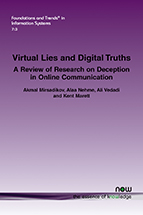Virtual Lies and Digital Truths: A Review of Research on Deception in Online Communication
By Akmal Mirsadikov, Wichita State University, USA, akmal.mirsadikov@wichita.edu | Alaa Nehme, Mississippi State University, USA, a.nehme@msstate.edu | Ali Vedadi, University of Tennessee, USA, avedadi@utk.edu | Kent Marett, Mississippi State University, USA, kent.marett@msstate.edu
Abstract
Whether we like it or not, deceptive communication is an ever-present aspect of personal interactions, and it should come as no surprise that it is deeply embedded in communication over computer-mediated means. Researchers in the field of information systems have studied deceptive communication for decades, borrowing theories from referent fields and ultimately developing their own. As the technology involved progresses and becomes more sophisticated, the manner in which deception is manifested online also becomes more complicated and the consequences become more severe, leading to renewed calls for research in this area.
This monograph reviews the theoretical foundations found in past IS research on computer-mediated deception, highlighting key studies that have contributed to our understanding of attempts to deceive others. The discussion then examines new directions that research should take in the hopes of inspiring more work in this critical area.
Virtual Lies and Digital Truths: A Review of Research on Deception in Online Communication
Virtual Lies and Digital Truths: A Review of Research on Deception in Online Communication reviews previous research that lies at the intersection of deception and computer-mediated communication and examines future directions that this research may be attuned to. As new varieties of online deception attract new researchers to the research effort, particularly within the field of management information systems, reviewing where the research stream originated and where it appears to be heading could be enlightening to those who hope to engage further with the topic.
This monograph is organized as follows. Following discussion defining and contextualizing deception within the field of information systems research, the authors review some of the prominent theories that have helped inform studies on the topic. These include seminal theories developed in the fields of communication, IS theory and other relevant disciplines that have helped explain deceptive communication and its detection across computer-based modalities. Key findings and implications from across research disciplines are reviewed. Then, the incidence of deceptive communication across generations of media and technology platforms is discussed. Finally, the monograph concludes with an overview of potentially important research gaps and a call for interested researchers to continue investigating deception in computer-mediated communication.
